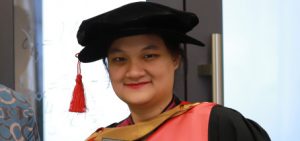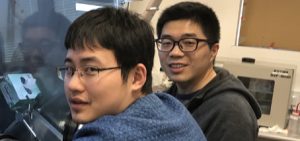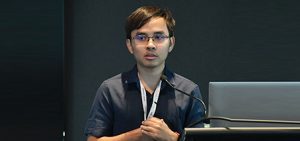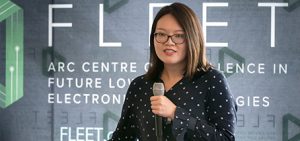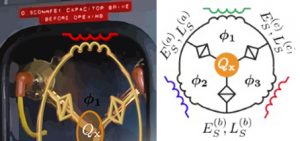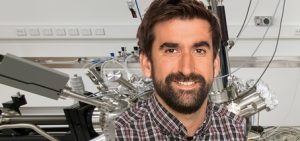FLEET News
Discovery has potential applications in artificial muscles, soft robotics and microfluidic circuitry In a breakthrough discovery, University of Wollongong (UOW) researchers have created a “heartbeat” effect in liquid metal, causing the metal to pulse rhythmically in a manner similar to a beating heart. Their findings are published in the 11 July issue of Physical Review Letters, the world’s premier journal …
Maths and spin: key to new electronics A love of maths brought Elizabeth Marcellina to the study of quantum and condensed-matter physics, where her recently completed PhD research studied possible routes to faster, more efficient electronics, by harnessing the ‘spin’ of the carriers in common semiconductors. As Moore’s law is coming to an end, much effort has been devoted to …
FLEET RMIT—UNSW collaboration measuring transport properties of van der Waals heterostructures FLEET PhD Cheng Tan (RMIT) visited UNSW’s labs in May to perform magnetic coupling measurements on 2D ferromagnetic crystals. The visit was reciprocated this month with FLEET Research Fellow Feixiang Xiang (UNSW) visiting RMIT to construct van der Waals structures for studying of 2D topological systems. This collaboration between …
FLEET collaboration traps light–matter particles FLEET’s Research theme 2 seeks to create near-zero resistance flow of exciton polaritons, which are hybrid quasi-particles that are part matter and part light. Their ability to flow without resistance relies on formation of an exciton-polariton condensate – a collective quantum state that behaves as a superfluid. In superfluids, particles flow without encountering any resistance …
FLEET will deliver much more than excellent science for Australian society. We are training some of the next generation of scientists, engineers, and entrepreneurs. We will help them develop not only technical research skills, but also transferable skills that will be useful to them no matter what their eventual career direction. For example, we have ensured that our research groups …
The challenge of finding a sustainable path to continuing the IT revolution is critical, and time is running out. I can tell you today with reasonable certainty that Moore’s Law will be declared dead within the seven-year operation of the Centre–perhaps even before our mid-term review! Computer chips will cease to gain in efficiency, and yet our demand for computation …
The information technology revolution has improved our lives, and we want it to continue. For example, our smartphone has become one of the most important devices of our everyday life: we use it to access up-to-date weather predictions, to plot the best route through traffic, and to watch the new series of House of Cards. And we expect it be …
Our insatiable appetite for computing means ITC already consumes 5–8% of global electricity, and is doubling each decade. Unless that ever-growing demand for computing can continue to be met with efficiency gains, the information revolution will slow down from power hunger. At the launch of a new Australian Research Council Centre of Excellence the audience heard that efficiency gains in current, …
Official launch: Australian Research Council Centre of Excellence in Future Low-Energy Electronics Technologies 12 June 2018, 11 AM New Horizons Building, Monash University, Clayton We have an insatiable appetite for computing. But our ongoing need for computation is burning more than 5 percent of global electricity. And that figure is expected to double each decade. A new Australian Research Council …
When using an electronic device to watch tv, listen to music, model the weather or any other task that requires information to be processes, there are millions and millions of binary calculations going on in the background. There are zeros and ones being flipped, added, multiplied and divided at incredible speeds. The fact that a microprocessor can perform these calculations …
Fresh minds develop hands-on learning methods for schools FLEET is developing innovative ways to communicate physics to school students. A collaboration with Monash University Science allowed the Centre to enlist fresh brains to this communications challenge. A team of maths and physics students from Monash Bachelor of Science–Global Challenges took on the task of developing hands-on games and resources to demonstrate …
In the popular movie franchise “Back to the Future”, an eccentric scientist creates a time machine that runs on a flux capacitor. Now a group of actual physicists from Australia and Switzerland have proposed a device which uses the quantum tunneling of magnetic flux around a capacitor, breaking time-reversal symmetry. The research, published this week in Physical Review Letters, proposes …
FLEET Chief Investigator Agustin Schiffrin spoke on science show Einstein a Go-Go about experimental physics at the atomic scale, and the study of exciting new nanomaterials with tailored electronic properties. Listen Agustin researches new nanomaterials with novel and exotic electronic properties, constructed of organic (carbon-based) molecules, sometimes inspired by bio-organisms. The team studies topological materials, which display a range of fascinating, …
FLEET shares the responsibility to support students and teachers to increase participation in science, and in particular works towards increasing the number of girls and women participating in physics, chemistry and engineering. The Centre Launch on 12 June will showcase FLEET’s science outreach programs, educating the public and inspiring a new generation of scientists. Home Science and FLEET Geeks programs …
FLEET postdoc Dr Carlos Kuhn described his field of ultra-cold atomic science and the fundamental discoveries made in an interview with RRR science show Einstein a Go-Go. The research will take a huge step forward this year with the commissioning of a new ARC-funded quantum-gas microscope, which will bridge the microscopic (atomic) and macroscopic (visible) worlds. Carlos also described his …


